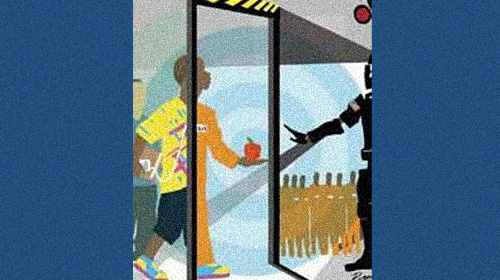
I recently read an in The Atlantic by Jeff Deeney about a school in Philadelphia that took an innovative approach to reduce youth violence in one of the most desperately poor areas of the city. Instead of relying on a hefty police presence to keep their students safe, their approachŌĆörelatively unheard of in an economically depressed school like this oneŌĆöcentered on empowerment, community support, and providing a stable environment for the students.
Deeney wrote:
Every day police would set up a perimeter of police officers on the blocks around the school, and those police were there to protect neighbors from the children, not to protect the children from the neighborhood. School police officers patrolled the building at [the school], and children were routinely submitted to scans with metal detecting wands.
So when took over the struggling school, renamed it Memphis Street Academy, and removed every remnant of the police state it once was, most expected the school to fall even further into chaos. But a funny thing happened instead: the number of violent incidents dropped by 90%.
According to internal anonymous surveys taken by Memphis Street Academy students, the majority of students now say they feel safe at school and that there's an adult at school who cares about them. A whopping 95% now say they hope to graduate from college one day.
We shouldn't be shocked that Philadelphia's gamble paid off. Studies and reports consistently demonstrate compared to the lock ŌĆśem up route, and the success of Memphis Street Academy should serve a model for schools across the country.
The (YPA), which is currently awaiting a vote in Congress, represents a tremendous opportunity to begin this systematic reversal of course by making sure kids are in school, not prison. The bill enables communities to kick-start their own Memphis Street Academy-esque changes through evidence-based reform programs aimed at curbing violence.
Unlike the situation in Philadelphia, this bill doesn't withdraw police presence. Instead, schools and communities will work with local law enforcement to ensure their presence is providing the maximum benefit to young people by encouraging mentorship and collaboration between youth groups and law enforcement.

A companion bill for the by Sen. Mary Landrieu (D-La.) and Sen. James Inhofe (R-Okla.) earlier this month after Rep. Bobby Scott (D-Va.) in the House in late spring. The bill was pushed forward by a recent Capitol Hill panel sponsored by the └Ž░─├┼┐¬Į▒Įß╣¹ŌĆöand moderated by our very own legislative counsel Jennifer BellamyŌĆöfeaturing Rep. Scott, Grammy-nominated musician and composer John Forte, and other experts and special guests.
The moral of Memphis Street Academy's story is clear: young people need our trust and support to succeed. The Youth PROMISE Act will give kids across the country the same opportunity to thrive.
Learn more about the Youth PROMISE Act and other civil liberties issues: Sign up for breaking news alerts, , and .


